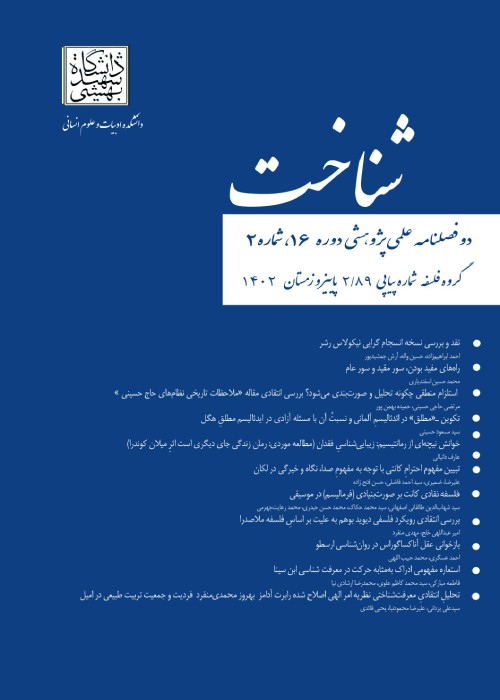Plato’s Historical Conception of Ancestors and its Relation to Etymology
Author(s):
Article Type:
Research/Original Article (دارای رتبه معتبر)
Abstract:
Plato’s different and somehow contradictory views on etymology has long resulted in debates. In Cratylus and some other works he criticized etymology as a philosophical method. He denied any resemblance between things and their names so that the analysis of a name would not discover the essence of the thing. Yet he has practiced in his other works some etymological analyses which seems to be in opposition with his previous view and therefore there has been the debate if Plato at all believed in etymology as a philosophical method. Cratylus is generally believed as one of the so-called middle dialogues, i.e. those Plato wrote in the second phase of his philosophical career, while the aforementioned etymologies appear in the late dialogues. It shows that after Cratylus Plato in his late dialogues has changed his mind regarding etymology and its epistemological worth and subsequently inclined/tended to it. Plato disagrees etymology in Cratylus since he thinks the greek name-givers have failed to gain the truth about things so that the names they made do not correspond to the things themselves. The name-givers, called usually as law-givers by Plato, are the same ancestors who have founded/stablished the greek laws, norms, traditions and the opinions. In Cratylus Plato is suspicious to the knowledge of greek ancestors and his disagree with etymology is one of its consequences. However, in his later works because of some unknown reasons he changes his previous view and praised the ancestors’ virtues and confirmed their superior knowledge. Simultaneous with the change, and opposed to what we find in Cratylus, in later dialogues it is said that the greek names in all aspects correspond to the objects and this seems to be, according to Plato, due to name-giver’s knowledge of the things. Thus the reason why Plato has asserted different views on etymology seems to be that he has changed his view regarding the ancestors. In this article the passages with the subject names, namegivers and ancestors will be collected and analyzed.
Language:
Persian
Published:
Journal of Recognition, Volume:11 Issue: 2, 2019
Pages:
137 to 164
magiran.com/p2005000
دانلود و مطالعه متن این مقاله با یکی از روشهای زیر امکان پذیر است:
اشتراک شخصی
با عضویت و پرداخت آنلاین حق اشتراک یکساله به مبلغ 1,390,000ريال میتوانید 70 عنوان مطلب دانلود کنید!
اشتراک سازمانی
به کتابخانه دانشگاه یا محل کار خود پیشنهاد کنید تا اشتراک سازمانی این پایگاه را برای دسترسی نامحدود همه کاربران به متن مطالب تهیه نمایند!
توجه!
- حق عضویت دریافتی صرف حمایت از نشریات عضو و نگهداری، تکمیل و توسعه مگیران میشود.
- پرداخت حق اشتراک و دانلود مقالات اجازه بازنشر آن در سایر رسانههای چاپی و دیجیتال را به کاربر نمیدهد.
In order to view content subscription is required
Personal subscription
Subscribe magiran.com for 70 € euros via PayPal and download 70 articles during a year.
Organization subscription
Please contact us to subscribe your university or library for unlimited access!



